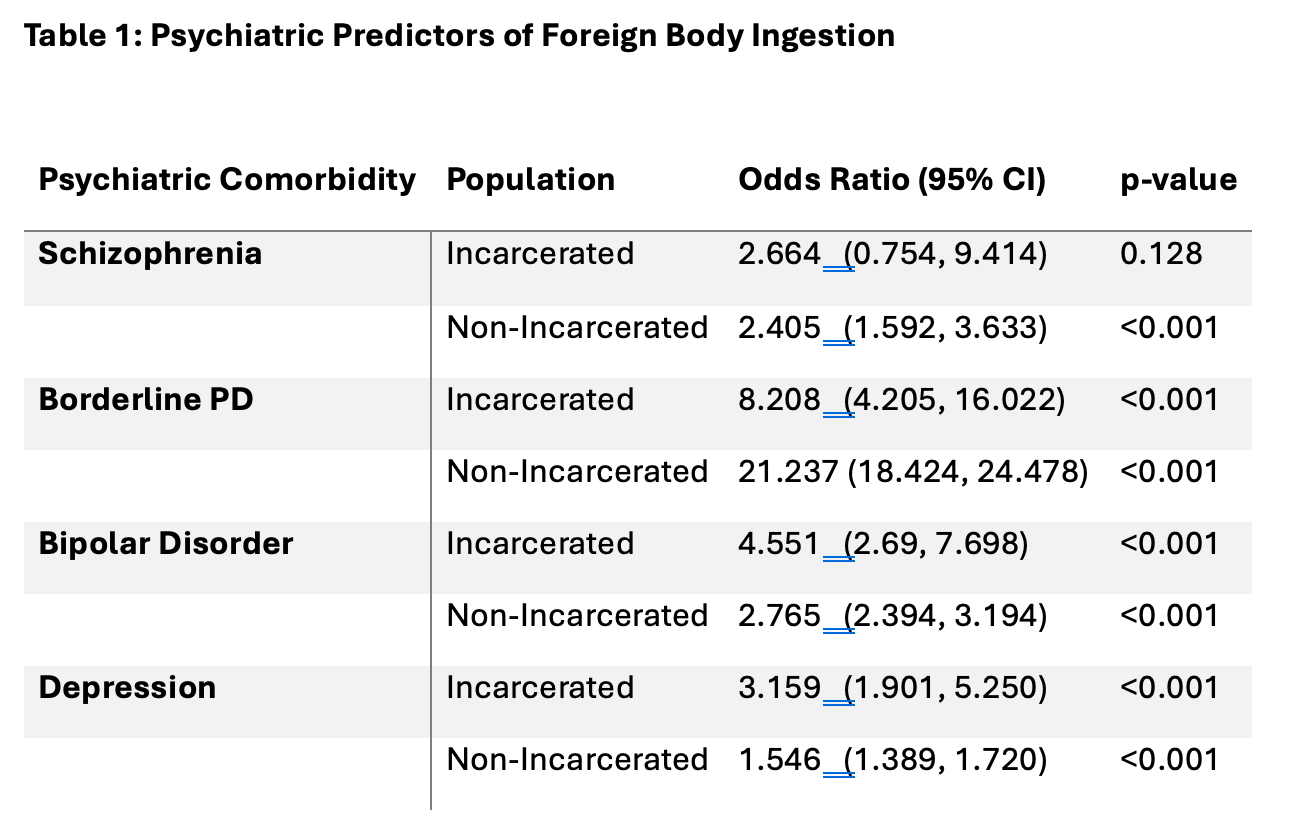Monday Poster Session
Category: General Endoscopy
P3003 - Associations Between Foreign Body Ingestion, Incarcerated Status, and Psychiatric Co-Morbidities: A Nationwide Analysis
Monday, October 27, 2025
10:30 AM - 4:00 PM PDT
Location: Exhibit Hall
- KO
Kashif Osmani, MD
University of Illinois at Chicago, Department of Internal Medicine
Chicago, IL
Presenting Author(s)
Kashif Osmani, MD1, Sean C. Tompkins, MD, PhD2, Itishree Trivedi, MD3
1University of Illinois at Chicago, Department of Internal Medicine, Chicago, IL; 2University of Illinois Chicago, Chicago, IL; 3University of Illinois, Chicago, IL
Introduction: Foreign body ingestion (FBI) is a major issue linked to psychiatric comorbidities and disproportionately affects incarcerated individuals, with an estimated 1 in 1,900 inmates affected annually. FBI accounts for up to 1,500 U.S. prison deaths each year and drives significant healthcare costs (median hospital charges > $14,000 per admission). While its association with psychiatric conditions is well-known, national-level differences between incarcerated and non-incarcerated populations remain unexplored. This study evaluates psychiatric comorbidities as predictors of FBI and compares their impact across these groups.
Methods: We analyzed the 2020 National Inpatient Sample (NIS) to identify FBI cases (stomach, esophagus, small intestine, colon) using ICD-10 codes. Psychiatric comorbidities (schizophrenia, bipolar disorder, depression, borderline personality disorder) and incarceration status were assessed. Logistic regression evaluated the predictive value of these comorbidities.
Results: We identified 2,637 FBI patients, including 92 incarcerated (3.5%). Schizophrenia increased FBI odds in both groups but was only statistically significant in non-incarcerated individuals (OR 2.41, 95% CI 1.59–3.63, p< 0.001). Borderline personality disorder (BPD) was the strongest predictor, with ORs of 8.21 (95% CI 4.21–16.02, p< 0.001) in incarcerated and 21.24 (95% CI 18.42–24.48, p< 0.001) in non-incarcerated patients. Bipolar disorder (BD) also showed strong associations (incarcerated OR 4.55, 95% CI 2.69–7.70; non-incarcerated OR 2.77, 95% CI 2.39–3.19; both p< 0.001), while depression had weaker but significant associations in both groups.
Discussion: This is the first study to compare psychiatric predictors of FBI between incarcerated and non-incarcerated populations. BPD emerged as the strongest predictor in both groups, while depression and BD doubled FBI risk among incarcerated individuals. These findings highlight the need for targeted psychiatric interventions and screening, especially for high-risk incarcerated populations, to reduce repeat FBI and its healthcare burden.

Figure: Table 1: Psychiatric Predictors of Foreign Body Ingestion
Disclosures:
Kashif Osmani indicated no relevant financial relationships.
Sean Tompkins indicated no relevant financial relationships.
Itishree Trivedi indicated no relevant financial relationships.
Kashif Osmani, MD1, Sean C. Tompkins, MD, PhD2, Itishree Trivedi, MD3. P3003 - Associations Between Foreign Body Ingestion, Incarcerated Status, and Psychiatric Co-Morbidities: A Nationwide Analysis, ACG 2025 Annual Scientific Meeting Abstracts. Phoenix, AZ: American College of Gastroenterology.
1University of Illinois at Chicago, Department of Internal Medicine, Chicago, IL; 2University of Illinois Chicago, Chicago, IL; 3University of Illinois, Chicago, IL
Introduction: Foreign body ingestion (FBI) is a major issue linked to psychiatric comorbidities and disproportionately affects incarcerated individuals, with an estimated 1 in 1,900 inmates affected annually. FBI accounts for up to 1,500 U.S. prison deaths each year and drives significant healthcare costs (median hospital charges > $14,000 per admission). While its association with psychiatric conditions is well-known, national-level differences between incarcerated and non-incarcerated populations remain unexplored. This study evaluates psychiatric comorbidities as predictors of FBI and compares their impact across these groups.
Methods: We analyzed the 2020 National Inpatient Sample (NIS) to identify FBI cases (stomach, esophagus, small intestine, colon) using ICD-10 codes. Psychiatric comorbidities (schizophrenia, bipolar disorder, depression, borderline personality disorder) and incarceration status were assessed. Logistic regression evaluated the predictive value of these comorbidities.
Results: We identified 2,637 FBI patients, including 92 incarcerated (3.5%). Schizophrenia increased FBI odds in both groups but was only statistically significant in non-incarcerated individuals (OR 2.41, 95% CI 1.59–3.63, p< 0.001). Borderline personality disorder (BPD) was the strongest predictor, with ORs of 8.21 (95% CI 4.21–16.02, p< 0.001) in incarcerated and 21.24 (95% CI 18.42–24.48, p< 0.001) in non-incarcerated patients. Bipolar disorder (BD) also showed strong associations (incarcerated OR 4.55, 95% CI 2.69–7.70; non-incarcerated OR 2.77, 95% CI 2.39–3.19; both p< 0.001), while depression had weaker but significant associations in both groups.
Discussion: This is the first study to compare psychiatric predictors of FBI between incarcerated and non-incarcerated populations. BPD emerged as the strongest predictor in both groups, while depression and BD doubled FBI risk among incarcerated individuals. These findings highlight the need for targeted psychiatric interventions and screening, especially for high-risk incarcerated populations, to reduce repeat FBI and its healthcare burden.

Figure: Table 1: Psychiatric Predictors of Foreign Body Ingestion
Disclosures:
Kashif Osmani indicated no relevant financial relationships.
Sean Tompkins indicated no relevant financial relationships.
Itishree Trivedi indicated no relevant financial relationships.
Kashif Osmani, MD1, Sean C. Tompkins, MD, PhD2, Itishree Trivedi, MD3. P3003 - Associations Between Foreign Body Ingestion, Incarcerated Status, and Psychiatric Co-Morbidities: A Nationwide Analysis, ACG 2025 Annual Scientific Meeting Abstracts. Phoenix, AZ: American College of Gastroenterology.

